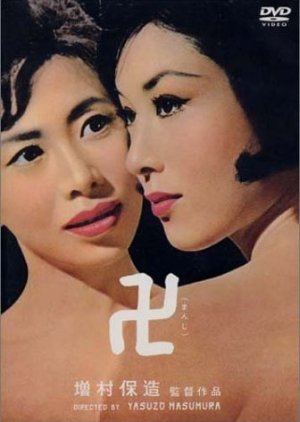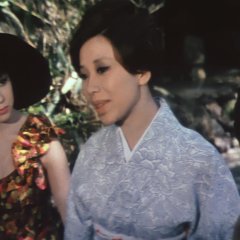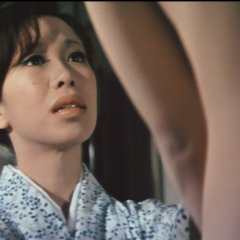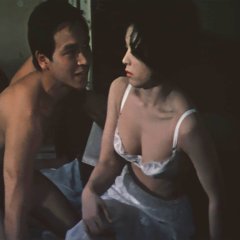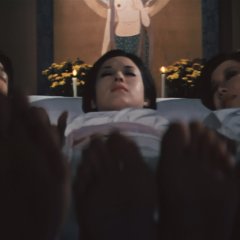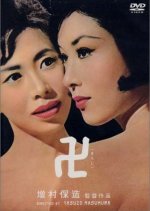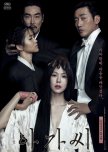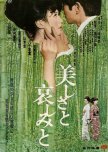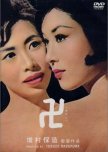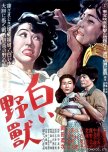- Français
- Русский
- English
- magyar / magyar nyelv
- Titre original: 卍
- Aussi connu sous le nom de: All Mixed Up , Passion , Swastika , The Goddess of Mercy , Страсть , まんじ , 卍 (まんじ)
- Scénariste: Shindo Kaneto
- Réalisateur: Masumura Yasuzo
- Genres: Romance, Drame, Mature
Distribution et équipes
- Wakao Ayako Rôle principal
- Kishida KyokoKakiuchi SonokoRôle principal
- Funakoshi EijiKakiuchi KotaroRôle Secondaire
- Kawazu YusukeWatanuki EijiroRôle Secondaire
- Mitsuda Ken[Novelist]Rôle Secondaire
- Hayakawa Yuuzou Rôle Secondaire
Critiques

Cette critique peut contenir des spoilers
Two's couple, three's a crowd…Four is a cross
* Sonoko, the bored wife of the lawyer Kakiuchi, attends a private art school and during her lessons, while portraying the Bodhisattva divinity Kannon, she meets the young Mitsuko, being fascinated by her... Soon an unstoppable passion breaks out between the two women, which sees the more mature Sonoko obsessed by the manipulative Mitsuko and which will see the two women find themselves entangled in a torrid sexual labyrinth that will end up involving even the ambiguous Watanuki, Mitsuko's promised husband, and Sonoko's own husband…Among other things, 1964 was the year that saw the remarkable encounter between the outstanding narrative style of the master Junichiro Tanizaki and the peculiar and unconventional cinematic vision of the great Yasuzo Masumura, a director capable of translating one of the Tokyo writer's masterpieces, the famous “Manji”, into images, rendered correctly in Italian as “La Croce Buddista” (The Buddhist Cross) and also released here as a movie with the adapted (but not taken out of context) title “La Casa degli Amori Particolari” (something like “The House of Unusual Loves”) and later also reworked by female director Liliana Cavani in a version transposed to World War II and titled “Interno Berlinese”...
Masumura inherited the project from Kon Ichikawa, who was in turn filming his work on the Tokyo Olympics. He enlisted the help of Kaneto Shindo for the screenplay and, more than faithfully respecting Tanizaki's novel (set in the late 1920s), he dried and compressed the pages of the book, dropping everything into a contemporary setting (recognisable by the clothes of the protagonists) with an almost theatrical feel, or a kammerspiel if you prefer…
An incredibly oppressive and claustrophobic setting (there are practically no outdoor sequences) with a skilful use of the flashback structure (just like in the novel), supported also by a beautiful chromatic rendering that emphasises the colours, but, above all, relying on his directorial dogmas, often criticised by artists such as Oshima, who had devoted more than one critical essay on Masumura's style to the method of the master of Kofu.
Masumura had formed in Italy, at the "Centro Sperimentale di Cinematografia", a Roma" (CSC) in the two-year period from 1952 to 1954, and this experience had allowed him to associate with other colleagues of the calibre of Federico Fellini, Roberto Rossellini and Michelangelo Antonioni, to name but a few; Returned to his homeland, he immediately distinguished himself by his unconventional approach and a style that went against the trends of classical filmmakers, but also of his younger colleagues (such as Oshima himself) with an anti-naturalistic style that made no concessions to spectacle and the desires of the audience
"Manji', in the hands of another director, could have lent itself to an easy reading as a canonical melodrama with a tragic background, but Masumura's extremely direct -and concise- treatment combines formal radicalism (non-conformist vision) and adequate psychological tension, as well as emphasising the peculiarities of his directorial style...
Despite the sensitive subject matter, which would lend itself to even more daring representations, the direction avoids any possible voyeuristic complacency (the few nudities are extremely chaste, it must be specified...), focusing mainly on the characterisation of the protagonists, particularly Sonoko (Kishida Kyoko, perfect), the more mature of the two women, who, inexorably overwhelmed by the attraction and desire for Mitsuko (a beautiful and very excellent Wakao Ayako, a true muse of the director) progressively falls into a spiral of madness, without shame or any concern for -relative- consequences, including social ones.
Sonoko, a “bourgeois” woman with a rather conventional life, dissatisfied with the greyness of a loveless marriage, ends up suffering -and accepting- the overwhelming sensuality of the younger and more elusive Mitsuko who, with her ambiguities, duplicity and progressive lies, perfectly embodies that character figure who is characteristically anaffective, unscrupulous and cynically anti-naturalistic at the basis of Masumura's cinematography.
In this somewhat hyper-realist short circuit, Mitsuko ends up almost assuming the role of a sacerdotess, or goddess no less, thanks in part to her total identification with the portrait of the goddess Kannon, to whom she had lent herself more or less indirectly as a model, and who will find her reason for being in the concluding self-destructive spiral...
The two male figures, Sonoko's husband (Funakoshi Eiji) and Mitsuko's ex-lover (Kawazu Yusuke), emblematically miserable and devoid of any qualities, will progressively end up “sucked into the self-destructive vortex of a passion that, beyond its erotic dimension, will reveal itself above all as a struggle for the possession and annihilation of the other”.
Masumura's cinema is extreme, disorienting and in some ways disturbing (but he would go even further in subsequent years), capable of bending the rules of melodrama to his sharp vision that plumbs the depths and highlights false bourgeois conventions, even repressive ones on the subject of sexuality, highlighting a radical critique of the hypocrisies of Japanese society.
It is not known whether Tanizaki was able to see (and appreciate or not) this reduction of his beautiful novel (the writer died the following year, in 1965), but it must be said, beyond the personal tastes of each spectator, that Masumura offers a decidedly respectful and even faithful representation of the most important passages, allowing us for once not to turn up our noses and find a pleasant exception to the age-old dilemma of the quality of films based on novels, more or less representable in cinematographic format...
8 ½
* I would like to indirectly thank the author Beniamino Biondi for his courageous work ‘ Giganti e Giocattoli - Il Cinema di Yasuzo Masumura’, for the many news and interesting insights; And, as always, for the beautiful catalogue ‘Racconti Crudeli di Gioventù’ (Nuovo Cinema Giapponese degli anni 60), Marco Muller and Dario Tomasi; Their essay is an inexhaustible and irreplaceable source when writing reviews…
Cet avis était-il utile?
Recommandations
There have been no recommendations submitted. Be the first and add one.

